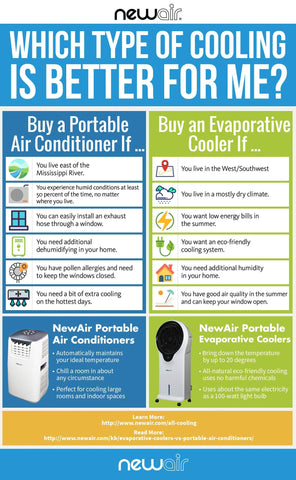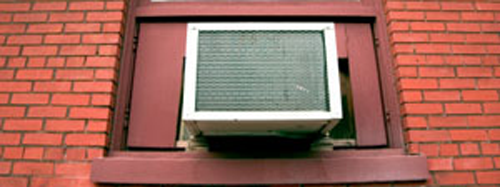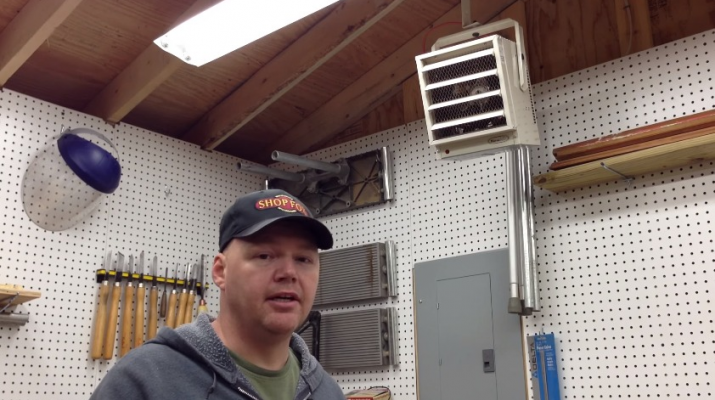Evaporative Coolers vs. Portable Air Conditioners: How to Breakup with Heat and Humidity
Are you in love with summer, but hate its excessive heat or humidity? Cooling your home in the summer months is crucial for your comfort and good health, but what’s the best way to go about it? Setting up basic fans for extra air movement is cost-effective, but it will only get you so far. On really hot days, you have two choices to get refreshing, cool air: an air conditioner or an evaporative air cooler. Each has pros and cons, and you’ll need to understand how they work to know which one is right for your situation.
Here is a breakdown of what you will learn in this post:

How Air Conditioners Work
NewAir Portable Air Conditioner with 8,000 BTUs. Photo by @magan.poole
Air conditioning is a modern marvel that removes hot air from your home and leaves behind drier, cooler air. Whether you have a central air conditioning system or a window unit, the concept is the same. AC units use a chemical refrigerant that’s kept flowing through a series of tubes or coils set up in a loop that connects the indoors to the outdoors. This is easiest to visualize in a window air-conditioning unit; part of it hangs outside and part is inside your house, but it’s all connected. The refrigerant absorbs the heat from indoor air and releases it outside, which is why you’ll feel a gust of warm air coming from an air conditioning system outside.
Do some air conditioning units really dehumidify the air?
Air conditioners also remove moisture from the air as they pull out the heat, which means they are default dehumidifiers as well. This bonus feature helps make the ambient temperature of a room feel even cooler, since dry air helps your body’s natural cooling system — your sweat — work more efficiently. When your sweat evaporates, it cools your skin, and evaporation is easier in a dry climate, whether that climate is all natural or created with the help of a window air conditioner.
NewAir Portable Air Conditioner with 8,000 BTUs. Photo by @caait.ruzsa
How do you improve your air conditioner efficiency?
For best results, any air conditioner — whether a central system, portable AC or a split air conditioner system — must work in a closed system. You need to keep windows closed to hold in the cold air and to keep the humidity level from rising after your machine has worked so hard to pump out all the heat. In fact, a portable air conditioner will require an exhaust hose through a window to get rid of the heat and humidity that’s being removed from the air.
Ac units are highly effective at chilling a room in just about any circumstance, but they require a lot of electricity to do so. They also use chemicals called HCFCs that are known to damage the ozone layer if not disposed of properly.
How Evaporative Coolers Work
Evaporative coolers are like air conditioners insofar as they are both capable of cooling a room, but they work in completely different ways.
Does an evaporative cooler use a compressor to cool?
Evaporative cooling doesn’t use chemicals to suck heat out of the air like AC does. An evaporative cooler — sometimes called a swamp cooler — only uses water and a fan to get the job done.
This works because the natural process of water evaporating into the air cools down the things nearby. You know this intuitively because it’s how you feel when you get out of a pool on a hot day: You get a chill as the water evaporates off your skin. The process is the same for the air around an evaporative cooler. Water soaks into a cooling pad with lots of surface area in an evaporative cooler, and the fan draws warm, dry air across the damp pad. This causes the water to evaporate quickly, which chills the air. The resulting colder air is spread around the room with the fan, so you feel cooler.
Do they really add more humidity to the air?
Unlike a traditional air conditioner, portable evaporative coolers add humidity to the air instead of removing it. Over time, this can result in high humidity inside your home, which can lead to clamminess and discomfort. For this reason, it’s actually best to keep a few windows open in your home while operating an evaporative cooler to allow a steady flow of dry, fresh air. This dry air is necessary for the evaporation to continue working efficiently to cool your home. This is pretty much the opposite of how an air conditioner runs best, which is with closed windows.
How do evaporative coolers and air conditioners differ?
Unlike a portable air conditioner, swamp coolers don’t need an exhaust hose, and they can be used outdoors as a great companion to a patio heater for year-round climate control in an outdoor room or by the pool. Most evaporative coolers can easily be moved from room to room with no effort thanks to the ventless system.
NewAir Evaporative Cooler and Fan. Photo by @fontes_four_pack
Evaporative coolers also use far less electricity than standard AC units, and they require no chemicals to cool the air, making them an eco-friendly choice.
Important Climate Considerations
Though a standard air conditioner can be used in any climate, an evaporative cooler’s effectiveness depends mightily on the level of humidity in the atmosphere.
Do evaporative coolers work in high humidity?
Swamp coolers won’t function well in humid climates because the water won’t evaporate quickly enough to cause a major drop in temperature in your room. In humid areas like Florida and the eastern half of the United States, you probably won’t want to do anything to add humidity to your room and increase the sticky feeling that so often makes the dog days of summer unbearable.
Where is an evaporative cooler most beneficial?
On the other hand, evaporative coolers are wonderful tools to use in dry climates like California, Phoenix, Arizona, and much of the Southwest. In these areas, you can save money by using an evaporative cooler because water will dissipate quickly into the arid air. You’ll even enjoy the boost in humidity that comes from using an evaporative cooler, which can eliminate the need for a whole-house humidifier to keep your skin, lips and nasal passages moist.
If you live in an area that is sometimes humid and sometimes dry, the success of an evaporative cooler will vary. It may be worth using it on dry days and having a portable air conditioner to cover you on humid days. If you’re flexible and keep your eye on the weather forecast for both temperature and relative humidity, you can toggle between the two for savings on your electric bill on days when you can get by with the evaporative cooler.
Can I use an evaporative cooler outdoors?
As for the outdoors, an evaporative cooler might offer some relief no matter where you use it, since the humidity it releases will quickly dissipate instead of being trapped in your home. Still, it won’t be much more effective than just a using a fan on muggy days if you live in a humid climate.
Evaporative Cooler Vs. Portable Air Conditioner Buying Guide
So which type of cooling is better for you? Check out the following checklists to help you decide which one is right for you.
Finding the right sized cooler
No matter which cooling system is right for you, it’s important to properly size your unit for best results. As you research your portable air conditioner or evaporative cooler, be sure to check the manual to see how many square feet the unit is designed to cool. Measure your room and purchase accordingly. An undersized unit will only disappoint you because it’s not designed to keep up with a large space. A too-large unit may end up costing you more than is strictly necessary to get good results.
Portable air conditioners and evaporative coolers are often a supplement for whole-house systems, so it’s unlikely that one will get the job done for an entire home, especially if your house has an open-concept floor plan.
The Bottom Line
NewAir Swamp Cooler and Fan. Photo by @realmklibrary
Swamp coolers vs. air conditioners may sound like the title of a summer sci-fi flick, but it’s an important question to answer when your comfort is on the line. To get the cool air you need in your home during the summer months, be honest with yourself about how humid your climate is and how much cooling you need to be happy. Low humidity is the key to success for evaporative coolers, so they’re not a one-to-one substitute for air conditioners in every climate.
NewAir Portable Air Conditioner with 14,000 BTUs. Photo by @thatstrangebunch
On the fence? Look for a combo unit that allows you to choose evaporative cooling or strictly a fan mode to have additional control over the humidity in your home. You’ll be able to take advantage of nature’s cooling system on dry days but still enjoy great air circulation when it’s muggier and you need to switch to standard air conditioning.




0 comments